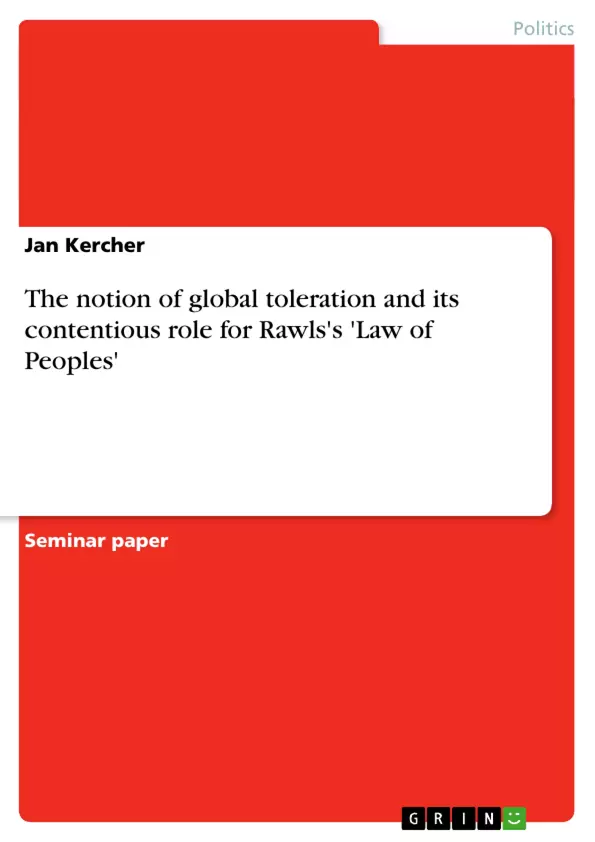Liberal toleration plays an important role in Rawls’s ‘Law of Peoples’. As in the domestic part of his theor y of justice, the right kind of tolerance, for Rawls, is one of the main requirements for stability. Thus, many of the striking alterations that Rawls undertook when he applied his theory to the international arena seem to go back to his concern for this important liberal idea. Since Rawls’s first sketch of his international relations theory, numerous critics have disapproved of his peculiar notion of liberal toleration and its consequences for his theory. One strand of criticism holds that, even if one acknowledges the Rawlsian justification of tolerance, many of the conclusions he draws in connection with it cannot be maintained. Another strand of criticism sees Rawls’s whole concept of justification as deeply flawed because of too many disanalogies to his own domestic theory.
In this paper, I want to show that a great deal of this criticism is legitimate. In order to do this, I will first give a brief overview of Rawls’s ‘Law of Peoples’ and its most important differences to his domestic theory of justice. Afterwards, I will reconstruct Rawls’s justification for the toleration of certain non- liberal peoples. Finally, I hope to show that this justification is highly problematic and a weakness that deeply influences the construction of Rawls’s whole international theory.
Inhaltsverzeichnis (Table of Contents)
- Introduction
- Rawls's Law of Peoples
- Justifying the Toleration of Decent Non-liberal Peoples
- Rawls's Justification of Toleration - A Valid Analogy?
- Rawls's Justification of Toleration - A Stringent Analogy?
- Conclusions
Zielsetzung und Themenschwerpunkte (Objectives and Key Themes)
This paper explores the contentious role of global toleration in John Rawls's "Law of Peoples", examining critiques of his justification for tolerating non-liberal societies. The paper aims to demonstrate that much of the criticism is valid, highlighting weaknesses in Rawls's construction of his international theory.
- The concept of global toleration in Rawls's "Law of Peoples"
- Analogy between domestic and international toleration
- Criticisms of Rawls's justification for tolerating non-liberal societies
- The impact of these criticisms on Rawls's international theory
- The relationship between liberal principles and non-liberal societies
Zusammenfassung der Kapitel (Chapter Summaries)
- Introduction: Introduces the concept of liberal toleration in Rawls's "Law of Peoples" and its importance for stability. Outlines criticisms of Rawls's notion of toleration, including those questioning the validity of its justification and those finding flaws in the concept itself.
- Rawls's Law of Peoples: Briefly outlines Rawls's aim in extending his theory of justice to the international arena, focusing on the crucial role of liberal toleration and the introduction of the "Society of Peoples". Discusses the differences between the domestic and international original positions and how Rawls justifies the selection of "peoples" rather than individuals as representatives.
- Justifying the Toleration of Decent Non-liberal Peoples: Examines the analogy between reasonable comprehensive doctrines in a liberal state and decent hierarchical states in the Society of Peoples. Explains the concept of toleration in Rawls's "Political Liberalism" and its relation to maintaining stability in a diverse liberal democracy.
Schlüsselwörter (Keywords)
The paper focuses on key terms and concepts like global toleration, liberal toleration, "Law of Peoples", "Political Liberalism", decent non-liberal peoples, reasonable doctrines, international justice, stability, and the relationship between domestic and international political theory.
Frequently Asked Questions
What is the "Law of Peoples" in Rawls's theory?
It is the extension of John Rawls's theory of justice to international relations, aiming to establish a stable and just "Society of Peoples".
Why does Rawls argue for the toleration of non-liberal societies?
Rawls believes that "decent" non-liberal societies should be tolerated to maintain global stability, similar to how reasonable comprehensive doctrines are tolerated in domestic liberalism.
What are "decent hierarchical peoples"?
These are non-liberal societies that do not have aggressive foreign policies, respect basic human rights, and have a "common good" conception of justice.
What is the main criticism of Rawls's global toleration?
Critics argue that the analogy between domestic individuals and international "peoples" is flawed and that his conclusions undermine liberal principles of justice.
How does Rawls's international theory differ from his domestic theory?
In the international arena, the representatives in the "original position" are peoples rather than individuals, leading to different requirements for justice and stability.
- Quote paper
- Jan Kercher (Author), 2004, The notion of global toleration and its contentious role for Rawls's 'Law of Peoples', Munich, GRIN Verlag, https://www.grin.com/document/26595



